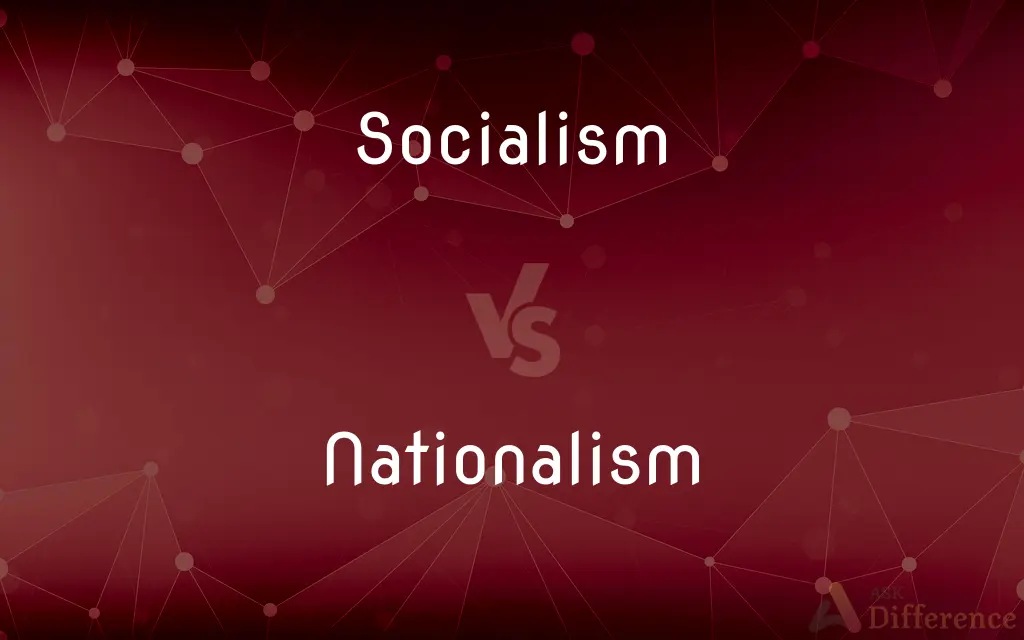Socialism vs. Nationalism — What's the Difference?
By Tayyaba Rehman — Updated on September 30, 2023
Socialism emphasizes equal distribution of wealth and income and collective or governmental control over much of the economy. Nationalism is a belief, or political ideology that involves an individual identifying with, and becoming attached to a nation.

Difference Between Socialism and Nationalism
Table of Contents
ADVERTISEMENT
Key Differences
Socialism fundamentally looks toward equal distribution and collective ownership, acting as a framework where resources and production capabilities are commonly owned, essentially minimizing disparities in wealth and social inequality. In contrast, Nationalism is built upon a sense of collective identity, based on cultural, historical, or social ties, and often leads to a strong belief in the sovereignty and self-governance of one’s nation or country.
While Socialism primarily addresses economic structures, seeking to diminish class distinctions by distributing wealth and opportunities equitably among citizens, Nationalism predominantly pertains to cultural and social ideologies, often bringing a shared communal identity to the forefront and emphasizing unity, irrespective of economic disparities.
Socialism tends to advocate for wealth redistribution and common ownership, which can lead to a reduction in socio-economic inequalities, and often supports governmental control over various aspects of society to achieve these ends. In a differing manner, Nationalism concentrates on fostering and prioritizing a shared national identity, which can sometimes foster an ‘us versus them’ mindset, potentially sidelining international collaboration in favor of national interests.
Through Socialism, societies might attempt to build structures where the needs of all are addressed equally and comprehensively, with systems and policies that aim to minimize disparities and uplift the socio-economically disadvantaged. Alternatively, Nationalism might forge a robust sense of belonging among citizens, where the collective focus pivots towards the well-being, global standing, and progression of the nation, occasionally at the expense of international partnerships.
Comparison Chart
Core Focus
Economic equality and shared ownership
Collective national identity and sovereignty
ADVERTISEMENT
Primary Objective
Redistribution of wealth and resources
Promotion and prioritization of national interests
Key Ideological Base
Economic
Cultural and social
Potential Global Approach
Inclined towards international cooperation
May prioritize national interests over global ties
Usual Economic Model
Government plays a key role in economic planning
Economic models can vary widely
Compare with Definitions
Socialism
A political philosophy emphasizing equal wealth distribution.
Socialism often entails governmental control over key industries.
Nationalism
A belief system prioritizing national identity and interests.
Nationalism can foster a strong sense of unity among citizens.
Socialism
A structure opposing capitalist economic models.
Unlike capitalism, Socialism opposes the concentration of wealth in a few hands.
Nationalism
A creed that can potentially sideline global collaboration.
Nationalism can sometimes result in an 'us versus them' mindset on a global stage.
Socialism
An economic system advocating collective ownership.
Socialism aims to prevent wealth disparities by sharing resources.
Nationalism
An ideology focused on sovereignty and patriotism.
Nationalism often elevates the nation above international considerations.
Socialism
A framework prioritizing societal over individual needs.
In Socialism, communal needs often overshadow individual wealth accumulation.
Nationalism
A principle advocating for national self-governance.
Nationalism played a vital role in many countries’ struggles for independence.
Socialism
Socialism is a political, social, and economic philosophy encompassing a range of economic and social systems characterised by social ownership of the means of production. It includes the political theories and movements associated with such systems.
Nationalism
Nationalism is an idea and movement that holds that the nation should be congruent with the state. As a movement, nationalism tends to promote the interests of a particular nation (as in a group of people), especially with the aim of gaining and maintaining the nation's sovereignty (self-governance) over its homeland.
Socialism
Any of various theories or systems of social organization in which the means of producing and distributing goods is owned collectively or by a centralized government that often plans and controls the economy.
Nationalism
Identification with one's own nation and support for its interests, especially to the exclusion or detriment of the interests of other nations
Their nationalism is tempered by a desire to join the European Union
Socialism
The stage in Marxist-Leninist theory intermediate between capitalism and communism, in which the means of production are collectively owned but a completely classless society has not yet been achieved.
Nationalism
Devotion, especially excessive or undiscriminating devotion, to the interests or culture of a particular nation-state.
Socialism
Any of various economic and political theories advocating collective or governmental ownership and administration of the means of production and distribution of goods.
Nationalism
The belief that nations will benefit from acting independently rather than collectively, emphasizing national rather than international goals.
Socialism
A system of social and economic equality in which there is no private property.
Nationalism
The belief that a particular cultural or ethnic group constitutes a distinct people deserving of political self-determination.
Socialism
A system or condition of society in which the means of production are owned and controlled by the state.
Nationalism
Patriotism; the idea of supporting one's country, people or culture.
Socialism
(Marxism-Leninism) The intermediate phase of social development between capitalism and communism in Marxist theory in which the state has control of the means of production.
Nationalism
Support for the creation of a sovereign nation (which does not currently exist).
Basque nationalism
Kurdish nationalism
Socialism
Any of a group of later political philosophies such democratic socialism and social democracy which do not envisage the need for full state ownership of the means of production nor transition to full communism, and which are typically based on principles of community decision making, social equality and the avoidance of economic and social exclusion, with economic policy giving first preference to community goals over individual ones.
Nationalism
Support for the union of Northern Ireland and the Republic of Ireland.
Socialism
Any left-wing ideology, government regulations, or policies promoting a welfare state, nationalisation, etc.
Nationalism
The state of being national; national attachment; nationality.
Socialism
A theory or system of social reform which contemplates a complete reconstruction of society, with a more just and equitable distribution of property and labor. In popular usage, the term is often employed to indicate any lawless, revolutionary social scheme. See Communism, Fourierism, Saint-Simonianism, forms of socialism.
[Socialism] was first applied in England to Owen's theory of social reconstruction, and in France to those also of St. Simon and Fourier . . . The word, however, is used with a great variety of meaning, . . . even by economists and learned critics. The general tendency is to regard as socialistic any interference undertaken by society on behalf of the poor, . . . radical social reform which disturbs the present system of private property . . . The tendency of the present socialism is more and more to ally itself with the most advanced democracy.
We certainly want a true history of socialism, meaning by that a history of every systematic attempt to provide a new social existence for the mass of the workers.
Nationalism
An idiom, trait, or character peculiar to any nation.
Socialism
A political theory advocating state ownership of industry
Nationalism
National independence; the principles of the Nationalists.
Socialism
An economic system based on state ownership of capital
Nationalism
A devotion to one's country; patriotism;
Socialism
An ideology seeking to minimize socio-economic inequalities.
Socialism advocates for policies that uplift disadvantaged populations.
Nationalism
The policy of advocating the independence of one's country.
Nationalism
The policy of advocating the interests of one's own country exclusively, regardless of effects of a country's actions on other countries.
Nationalism
Love of country and willingness to sacrifice for it
Nationalism
The doctrine that several different cultures (rather than one national culture) can co-exist peacefully and equitably in a single country
Nationalism
The aspiration for national independence felt by people under foreign domination
Nationalism
The doctrine that nations should act independently (rather than collectively) to attain their goals
Nationalism
A viewpoint often opposing global integration.
Extreme Nationalism sometimes opposes international collaborations and alliances.
Common Curiosities
What is the fundamental focus of Socialism?
Socialism fundamentally focuses on equal distribution of wealth and collective ownership of resources.
Is Nationalism always opposed to international cooperation?
No, but Nationalism can prioritize national interests which may sometimes limit international cooperation.
How does Nationalism perceive a nation’s global role?
Nationalism often prioritizes a nation's interests, sometimes at the expense of international collaboration.
Can Socialism coexist with capitalistic elements?
Yes, some systems, known as social democracies, combine socialism with capitalism.
Can Nationalism lead to xenophobia?
In some instances, extreme Nationalism has been associated with xenophobia and isolationism.
What does Socialism say about wealth distribution?
Socialism advocates for equal wealth distribution and often involves mechanisms for redistributing wealth.
Share Your Discovery

Previous Comparison
Hoop vs. Jockey
Next Comparison
Friendly vs. UnfriendlyAuthor Spotlight
Written by
Tayyaba RehmanTayyaba Rehman is a distinguished writer, currently serving as a primary contributor to askdifference.com. As a researcher in semantics and etymology, Tayyaba's passion for the complexity of languages and their distinctions has found a perfect home on the platform. Tayyaba delves into the intricacies of language, distinguishing between commonly confused words and phrases, thereby providing clarity for readers worldwide.
















































